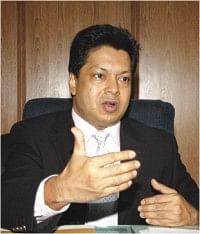Making sense of money

Aziz Al Kaiser
Money doesn't create ideas. It is ideas that create money.
If ideas talk, Aziz Al Kaiser makes a lot of sense. As the chairman of The City Bank, he has witnessed an astonishing 138 percent growth in net profits just between 2007 and 2009.
A first generation private commercial bank established in 1983, it started its second journey with a new slogan, and rebranding its logo in 2007.
Now it has become an example for others on how a bank can be transformed so fast.
The bank was not in the good book both of the regulator and the customers till the end of 2006 mainly because of its poor performance and services and interference of the board.
Things started changing rapidly since January 2007 when a new board under the leadership of young businessman Aziz Al Kaiser took over the charge of the bank.
The chairman credited the bank's success to good understanding between the board and the management that has turned a once-troubled bank into a service-oriented and profit-making one in a span of just three years.
Now the bank's profit after tax reached nearly Tk 82 crore in 2009 from just Tk 34 crore in 2007.
The major changes the board and management have successfully carried out since 2007 are full automation and making the bank's operation fully centralised.
All the 88 branches of the bank now have become a mere sales and service centres.
City Bank is the first in the country to have issued dual currency credit card and American Express Gold Credit card during this time.
The bank has more other success stories in a wide range of areas including launching of massive retail and SME banking.
All these initiatives have helped the bank earn two prestigious awards this year.
The bank has achieved the 'Strongest Bank in Bangladesh 2010' award and its managing director and chief executive officer K Mahmood Sattar has won The Asian Banker 'Leadership Achievement Award 2010' given by The Asian Banker, a research and intelligence company dedicated to providing services to the financial sector.
“We have achieved this tremendous success in just three years because of a very good understating between the board and the management,” Aziz Al Kaiser, chairman of the bank, told The Daily Star in an interview yesterday.
There must be a good understanding between the chairman and the CEO of a bank, he says.
Kaiser, also known as Tito, now dreams his bank will become the best bank in Bangladesh in terms of services, products, management and compliance.
“By 2012 we'll become a financial supermarket where varieties of products will be on a shelf. Customers will come and look into the services they want,” says Kaiser who is in his early 40s now having experience of running a bank for already over a decade.
“By then, home services will also be on offer,” he says.
Also the vice chairman of Partex Group, one of the leading business houses in the country, Kaiser has talked on the issues like the bank's cost of fund, interest rate, the future of the banking industry and the capital market.
He says there is no alternative to recruiting efficient management to reduce the cost of fund.
“Many of the banks here are oversized in manpower. Also, there are a lot of non-performing employees who are a big contributor to a rise in the cost of fund.”
He says The City Bank has decided to offer a voluntary retirement scheme soon for those non-performing employees.
Besides a reduction in cost of fund, non-performing loans and cost of borrowing should be brought down to offer a lower lending rate, Kaiser says.
“City Bank is already lending at 10.5 percent, but it depends on the clients. Increasing competition among the banks will reduce the rate.”
He also cautions the banks about future challenges.
The City Bank chairman says the banking sector in Bangladesh is awaiting tough challenges and difficulties in the years to come, as more foreign banks will join the market with their state-of-the-art and technology-based products and services.
“The local banks have to have good assets and balance sheets, otherwise many of them will die or have to get merged with others for survival,” he says.
On the Bangladesh's capital market, he says it runs on rumour, not on fundamentals.
[email protected]

 For all latest news, follow The Daily Star's Google News channel.
For all latest news, follow The Daily Star's Google News channel. 



Comments